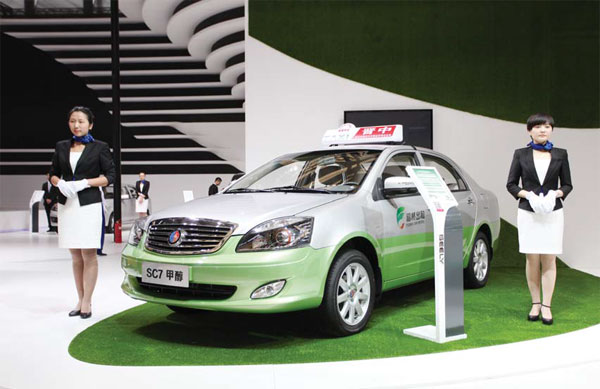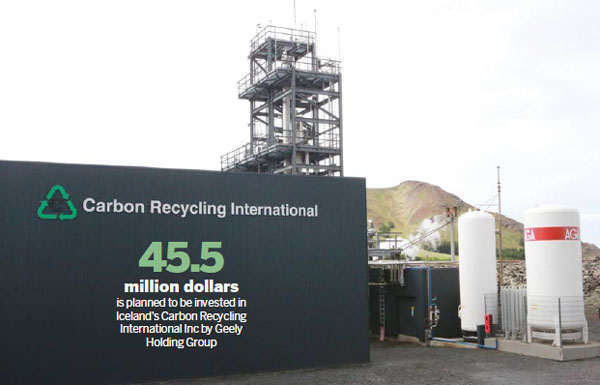Clean Icelandic fuel draws Geely
Updated: 2015-07-10 07:25
By Zhang Chunyan(China Daily Europe)
|
|||||||||||
Chinese car company invests in renewable methanol firm in bid for joint development of low carbon energy
Even in summer, Iceland can be cold and chilly. But the North Atlantic country has had a warm welcome for Chinese investment in an Icelandic clean-energy company announced this month.
Chinese automaker Geely Holding Group said on July 3 that it plans to invest $45.5 million in Iceland's Carbon Recycling International Inc. CRI is known as a leading company in producing renewable methanol from carbon dioxide, hydrogen produced by electrolysis of water, and electricity for energy storage, fuel applications and efficiency enhancement.
|
Above: China's auto maker Geely Group plans to invest a total of $45.5 million in Carbon Recycling International in Reykjavik, Iceland. It operates the world's first renewable methanol plant. Below: Geely's methanol-fuelled vehicles in China. Photos provided to China Daily |

The deal consists of an initial investment and additional purchases in CRI equity over three years. Geely will become a "major shareholder" of CRI and will gain representation on the company's board of directors. It did not specify how much of the company it will hold.
The two companies intend to collaborate on the deployment of renewable methanol fuel production technology in China and explore the development and deployment of 100 percent methanol-fueled vehicles in China, Iceland and other countries.
Methanol is a clean-burning, high-octane fuel that can be blended with gasoline for automobiles and used in the production of biodiesel or fuel ethers. It reduces carbon emissions by more than 90 percent compared with fossil fuels.
CRI's emissions-to-liquid process removes carbon dioxide from industrial emissions, the company says, which can help mitigate environmental impacts.
"This investment will build on our existing methanol technology, facilitating even more valuable solutions and helping to propel this part of our business in China. It will also allow us to promote advanced methanol technology in Europe," says Li Shufu, chairman of Geely Group, based in Zhejiang province.
"Geely and CRI share a vision for a larger role for methanol as a clean and sustainable fuel in China, Europe and the world," Li says.
Geely became the first auto manufacturer in China to conduct research and development into methanol vehicles in 2005. It has since acquired dozens of patents.
"We are committed to achieving the long-term goal of zero emissions mobility through a diverse suite of new-energy solutions, including renewable methanol vehicle technology," Li says.
"Geely Auto has invested significant resources in the development and promotion of methanol-fueled engines and vehicles over a long period and has already made progress with this technology in China."
The company is working with partners across China to expand the use of methanol-fueled vehicles and has deployed fleets of methanol-fueled taxis in cities all over the country.
In March 2013, Geely began piloting the use of methanol-fueled vehicles, and last year it became the first company in China to achieve mass production of vehicles.
China is serious about the use of alternative energy to reduce its reliance on fossil fuels as well as to fight air pollution. The country has set a target of producing and selling 500,000 energy-efficient vehicles a year by the end of this year, and 5 million a year by 2020.
Li says he believes Geely is a natural investment partner for CRI. "With the deepening of this partnership, we will explore the possibility of promoting methanol vehicles that will meet local standards in Iceland and other European countries."
As one of the leading international automotive groups in China, Geely consists of a number of auto brands, including Swedish automaker Volvo Car Corp, the United Kingdom's London Taxi, and Geely Auto, which markets cars in 35 countries across the world.
"Geely is unique in researching and manufacturing methanol vehicles around the world, and so is CRI in converting carbon dioxide into methanol. The cooperation between these two companies will promote the development of clean energy and the carbon cycle economy," Li says.
Geely's Englon SC7 sedan was the first methanol-fueled car to receive approval from China's Ministry of Industry and Information Technology.
Scientific studies indicate that besides slashing pollution, methanol-fueled cars cost on average 40 to 50 percent less to run than the traditional gasoline-powered equivalent.
Founded in 2006 in Reykjavik, Iceland, CRI has focused on developing technology to produce renewable methanol fuel. Production of renewable methanol is similar to that of conventional methanol, except that carbon dioxide is substituted for carbon monoxide and hydrogen is produced by electrolysis of water, according to the company. It operates the world's first renewable methanol plant.
"It's a great pleasure to have Geely Group join our team of shareholders and board of directors. Alongside their growing traditional automotive business, Geely Group is spearheading new-energy technologies and vehicles as one of the important players that will shape the future of the automotive sector," says K.C. Tran, CEO and co-founder of CRI.
"Amid increasing global demand for low carbon intensity fuels, as the first company in the world to develop renewable methanol technology and operate a CO2-methanol plant, CRI is building a pipeline of projects with clients from the power, chemical and steel industries in Europe and China."
CRI has an annual production capacity of 4,000 metric tons of renewable methanol, marketed under the name Vulcanol in Europe, where it is blended with gasoline and used for the production of biofuel.
"Geely Group's investment represents another validation of our business model and efforts and will strengthen our ability to develop and promote methanol as a sustainable transport fuel," Tran says.
CRI's plant is linked to the Svartsengi geothermal station in southwestern Iceland, whose surplus mineral-rich water fills up the Blue Lagoon, one of Iceland's most popular tourist attractions.
The plant emits little carbon dioxide, but what is emitted is in a very concentrated form, which makes the transformation of CO2 into methanol financially viable, as opposed to a coal plant, for example, where the separation of CO2 and nitrogen is costly.
Iceland sees China as a key trading partner, becoming the first European country to sign a free trade agreement with Beijing in 2013.
Zhang Weidong, China's ambassador to Iceland, says the China-Iceland free trade pact lowers tariffs on a range of goods and is expected to boost seafood and other exports from the Nordic island nation to China.
Geely's deal is the first direct Chinese investment in Iceland, Zhang says, adding that he thinks more investment will come from China.
Chinese investment has not always had smooth sailing in this country, however. Chinese investor Huang Nubo was stymied in his bid to build an adventure tourism resort on a barren patch of northeastern Iceland that would include an airport, golf course and 120-room hotel.
Iceland rejected his original bid in 2011 to purchase the land that comprises 0.3 percent of Iceland's territory, saying it did not meet the legal requirements on foreign ownership, prompting an angry Huang to blame Western prejudice and unfounded suspicions.
zhangchunyan@chinadaily.com.cn
(China Daily European Weekly 07/10/2015 page13)
Today's Top News
SCO summit opens in Russia's Ufa
Want to divorce? It's a long line in Guangdong
Panda lease system to be reformed
SCO can play major role in Silk Road, Xi says
Official denial raises doubts over '40-year-old meat' story
BRICS 'disappointed' by US failure to ratify IMF reform
BRICS summit condemns WWII 'misrepresentation'
Stocks surge as government moves to save market
Hot Topics
Lunar probe , China growth forecasts, Emission rules get tougher, China seen through 'colored lens', International board,
Editor's Picks

|

|

|

|

|

|







